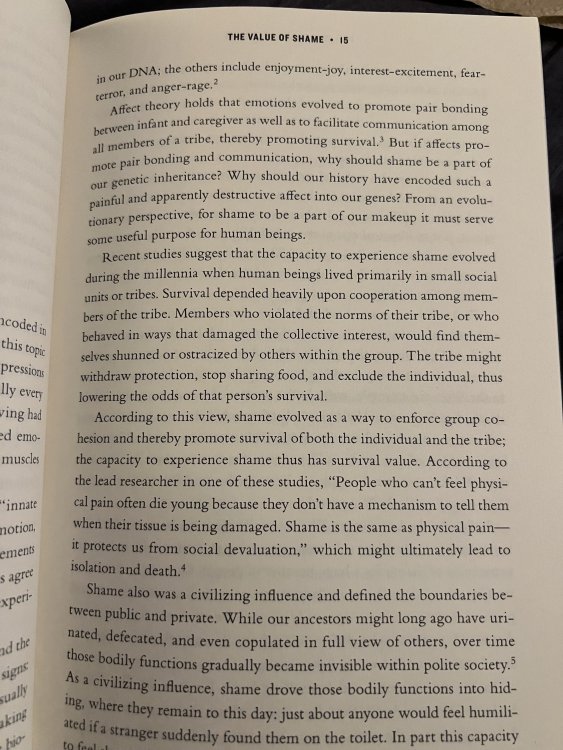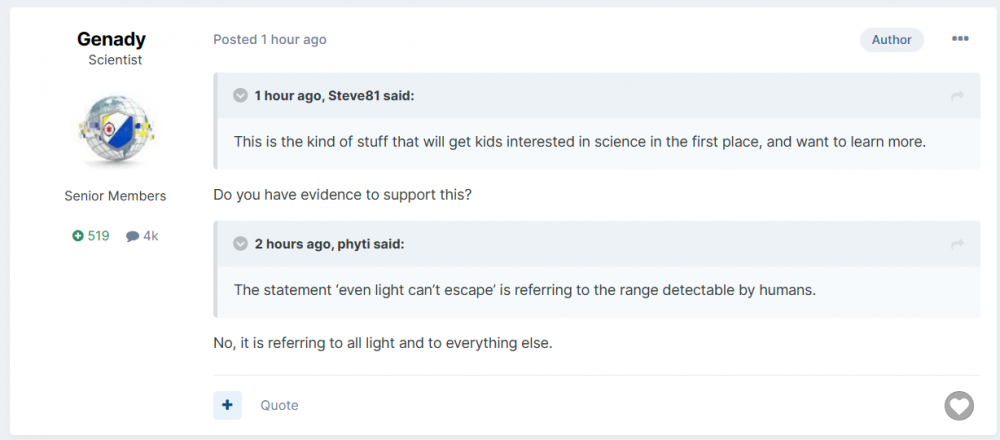-
Posts
294 -
Joined
-
Last visited
Content Type
Profiles
Forums
Events
Everything posted by Steve81
-
Well I doubt I’m going to find a study quite that specific. But, as @Janusjust noted, the trampoline is an analogy that’s easier to visualize. Perfect, perhaps not. But students clearly like demonstration based learning based on the survey results, and it does drive interest.
-
MIT did a study a while back regarding tailgaiting and traffic jams. I can’t seem to find the actual report, but it appears looking at the graphic that the analysis was confined to a single lane. My hypothesis is that this effect is compounded in a multi-lane scenario, based on my observations driving in DC traffic. An additional source of trouble here may be people that are obligated to change lanes, but have to wait for a gap in traffic, thus slowing down their lane. The tendency of people to try and switch lanes to the faster moving lane may also exacerbate the issue. I would also expect that a sudden unsafe lane change (cutting someone off) could exhibit similar effects, as the driver being cut off is forced to brake, sometimes significantly so.
-
@Genady@zapatos@Phi for All@iNow Link to a study regarding a specific demonstration, with student feedback. Items of interest:
-

Just a “funny” story about my experience in the hospital
Steve81 replied to Steve81's topic in Medical Science
Please explain your methodologies for accounting for this factor in your analysis. -

Just a “funny” story about my experience in the hospital
Steve81 replied to Steve81's topic in Medical Science
In hindsight, I should have said people hide their bad deeds like a dead body in the backyard. Ahh well. I still get a chuckle out of it. -
With respect to the values, virtues, and principles part of your post, it likely varies considerably from person to person. Religious/moral objections likely play a role for many. Trying to limiting societal harm from drug addicts desperate for a fix is another. Trying to save drug users lives from extremely dangerous drugs (in the wrong hands at least) like Fentanyl could be a factor for some as well. Effects and long-term consequences are a bigger analysis, especially when you start accounting for garbage like the CIA-Contra Cocaine trafficking business going on in the shadows. Certainly there was a massive spike in incarceration rates. Large sums of money were spent in a futile attempt to stem the flow of illegal drugs, as well as arresting and incarcerating offenders. Some of this was presumably recouped via Asset Forfeiture. Racism was naturally a factor in who got arrested for drug related crimes. Overall...it was a giant **** show. How can it end? I'm not entirely sure. I can't imagine Fentanyl being legalized for street use (it is a fun ride though 😛). Marijuana legalization may help. Some consider it a gateway drug, but I consider it reasonably safe drug that most (but not all) people can tolerate, and it's a good enough ride that it may be enough to get people to forget about harder stuff. We'll have to see if any studies come out to prove that hypothesis. In my super-scientific one-man study, I didn't find the effects of Fentanyl delivered at the hospital to be a dramatically superior experience to medical marijuana. Ultimately, we just need better resources to help people with drug addiction. Incarceration hardly seems like it would help people kick the habit, and recidivism rates among Federal drug offenders don't seem like anything to brag about.
-

Just a “funny” story about my experience in the hospital
Steve81 replied to Steve81's topic in Medical Science
Have you considered the bias caused by the fact that people readily report good acts, and hide bad ones (yet again looping back to shame 😛) in your analysis? What we do behind closed doors tells us a lot about our nature. As a fun addendum to that, you can see my nature that I get snippy when I get frustrated 😛 Still, I generally prefer constructive, thoughtful conversation to pointless bickering. Just saw this part of your earlier post. Regarding the that all actions are selfish, I would agree with that from my experiences. If you check out the How to Excel at Technical Support tidbit I threw up on the forum, you'll find that I note that being courteous to all the parties I interact with improves my job performance, sometimes in unexpected ways. I'm also generally much happier in my job when I act this way, so even if it might have been a mask at first, it's not now (though this is hardly a groundbreaking psychological phenomenon). Does it matter to the clients that I serve one way or the other? I don't know. I can't know what they heard on the other end of the phone when I spoke with them earlier versus now, which is to say I can't know how convincing my mask was. All I can say is they're definitely happy with my performance now (company started doing random surveys recently.) -

Just a “funny” story about my experience in the hospital
Steve81 replied to Steve81's topic in Medical Science
So what about our inherent nature do you feel makes us essentially "good", i.e. altruistic? I would opine the presence of shame in our coding is a good thing on balance, and tends to push us towards altruism (even if it takes a while...). Our ability to think rationally is more of a mixed bag. It can and has been used for good and ill. Beyond that, I don't know what aspects you're considering. -

Just a “funny” story about my experience in the hospital
Steve81 replied to Steve81's topic in Medical Science
So if I acknowledge that there are genetic factors (and certainly we're not all the same at birth), can we identify what genetic properties might predispose a person to be "good" as you might define? As a practical matter, how can we separate that from the teaching aspect of the puzzle, to determine which is responsible for a particular good act? How do we even determine the motivations of that good act, given that we're relying on a subjects capable of deception? People can do good things for non-altruistic reasons after all. -
Just to add a few more thoughts in a hopefully civil manner... I would add that while I don't personally partake in science as you might consider it, I do consider the knowledge and understanding of our universe (as best to my ability) to be a little more than just a cool collection of facts. My mind is more engineering oriented (which is to say I prefer problem solving over what you do) so science definitely comes into play, just in a different manner.
-

Just a “funny” story about my experience in the hospital
Steve81 replied to Steve81's topic in Medical Science
It does answer your question, depending upon what you define as human nature. If you take a newborn human baby and toss him into the wild, what will he become (aside from food for an animal) without other humans to teach him? That's what human nature is as I'm defining it. What we teach our children is what makes them civilized, and capable of social interaction. On the alternate end of the spectrum, we can also teach our children to be monsters via neglect and abuse. And to restate, I don't think human nature is in that respect is inherently good or bad. But being living creatures, we do have certain built-in survival instincts (what I define as our nature) that may not always produce good results in a group environment. That's where shame comes in. Over time, we've gotten better at producing a more civilized society as a result of it, and more enlightened philosophies emerging that changed the ideals of society. To wit, if no one was ashamed to own slaves, we'd still probably have slavery. -

Just a “funny” story about my experience in the hospital
Steve81 replied to Steve81's topic in Medical Science
-
Mostly anecdotal from my wife, who as I mentioned is a teacher.
-
Ahh so we’re back to attacks then.
-
I’m familiar with the scientific method and it’s purpose, thanks. But yes, science for tykes, and for most people, is little more than what you describe. Ultimately you have to start somewhere though.
-
What questions were asked, and what age were the children? Why I ask is that you can’t expect an 8 year old who can barely tie his shoes to ask questions the way you would.
-
The crux of the matter is that they ask the questions. The kids that said nothing weren’t apparently interested in the science of the demonstration. The kids that did have questions were, assuming they were halfway relevant.
-
Being interested in a demonstration and asking questions as you observed, is displaying an interest in science, albeit one limited to the topic of the demonstration.
-
What point, exactly, do you think I'm trying to make? Spell it out clearly for me so I don't misunderstand please, and hopefully we can move on from this sordid business.
-
Thank you for providing the observational evidence that proves my point, even if you didn't intend to do so. Asking questions is interest. Providing answers lets them learn. Not every interested child will turn into a scientist of course, only a small fraction. But the more kids interested, the better.
-
There's a handy tool, it's called Google. Find it yourself. If you find evidence to the contrary, feel free to post it, and I will retract my statement.
-
Do you accept my revised statement that Genady agreed with as self evident, or would you still prefer I try and find a study someone did to prove my point? I don't mind being questioned / challenged, but it seems ridiculous to ask for evidence of such a statement. You can disagree, that's fine. But I'm not spending hours trying to dig out a research paper to prove something so basic on a forum.
-
He wasn't questioning the specific experiment; if he was, he did so poorly by his choice of text to quote. In any case, his follow-up indicated, he questioned that science experiments at all would get kids "interested". All this because of a faulty, and utterly ridiculous inference that I meant every child would be interested in science as a result of observing science experiments. A difference without a distinction, sir. That's one opinion, but in the real world we teach children things that are grossly oversimplified all the time, just to instill a basic understanding of a topic. Just how accurate do you think elementary school history lessons are, exactly?
- 132 replies
-
-1
-
Did you read his post? He's asking for evidence to support a pretty easy to read statement that anyone with a basic grasp of the English language can understand. That's being deliberately obtuse, and if that's the kind of behavior you wish to defend as a moderator, I'm done here.
- 132 replies
-
-2
-
Re: lithium deuteride, that’s only for the second stage AFAIK; given the relative densities, it allows for much more compact thermonuclear weapons like the W80 warhead. I forget the test name where they found out LD would work, but they got a lot bigger bang then they were expecting. For boosted fission primaries, gas is still used because the amount of gas needed is insignificant and it allows flexibility for dial-a-yield designs.




